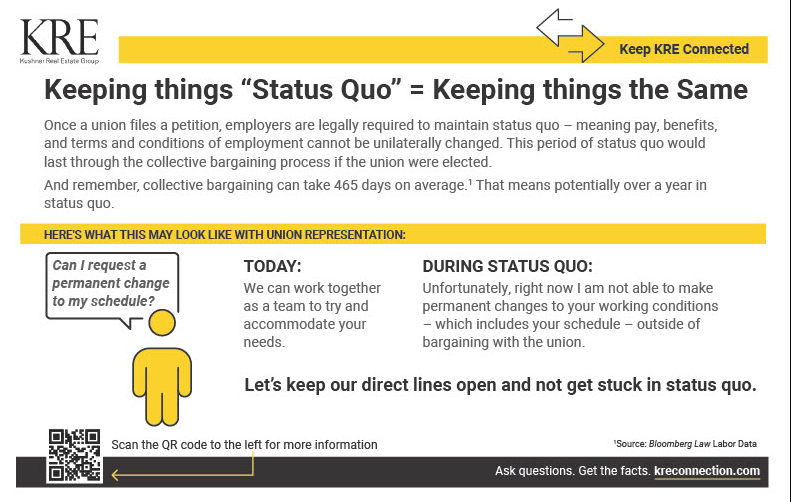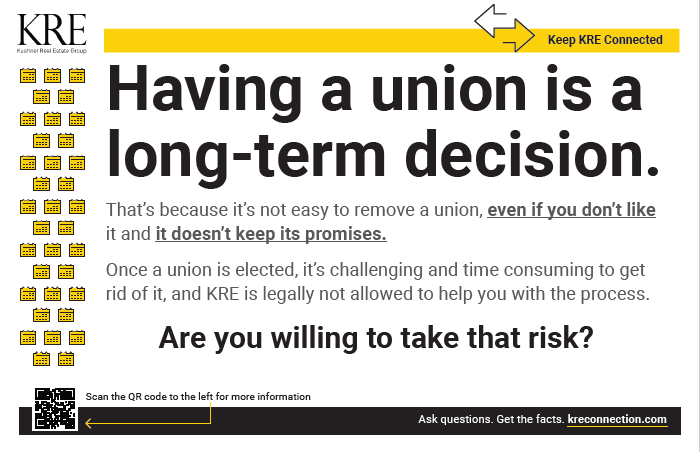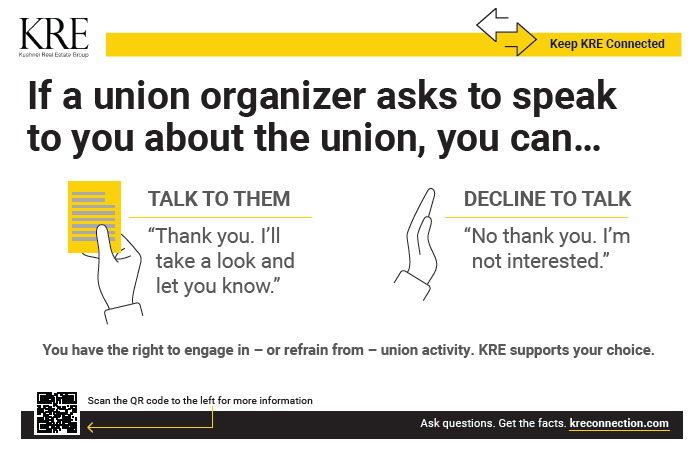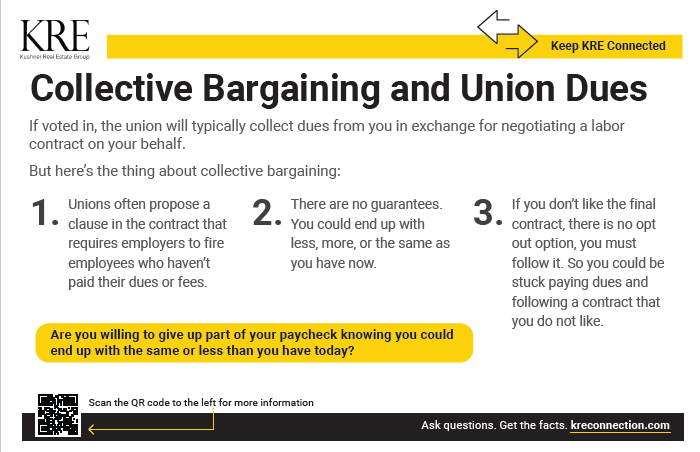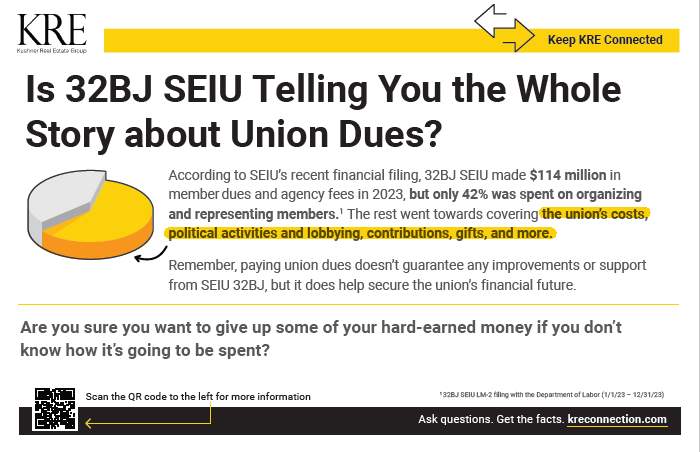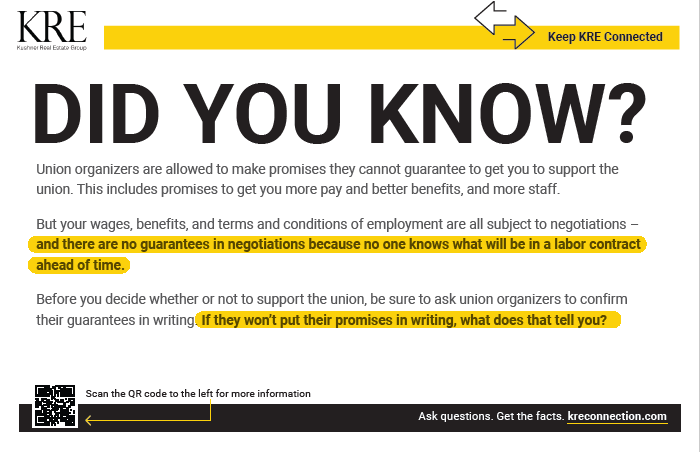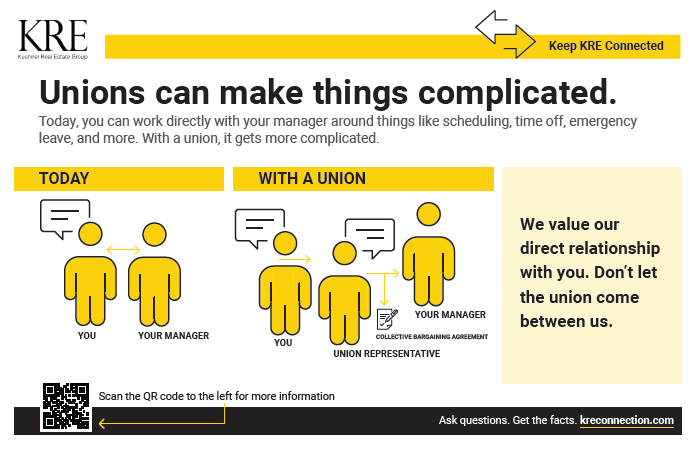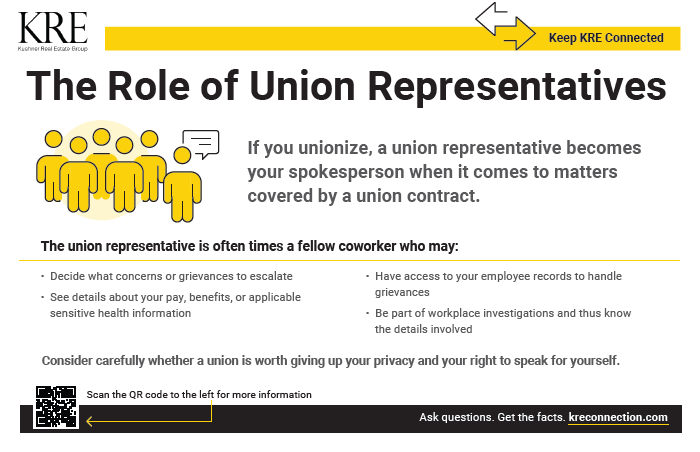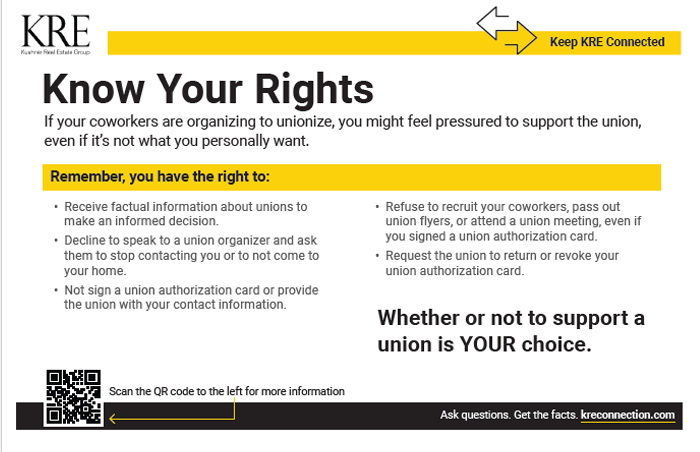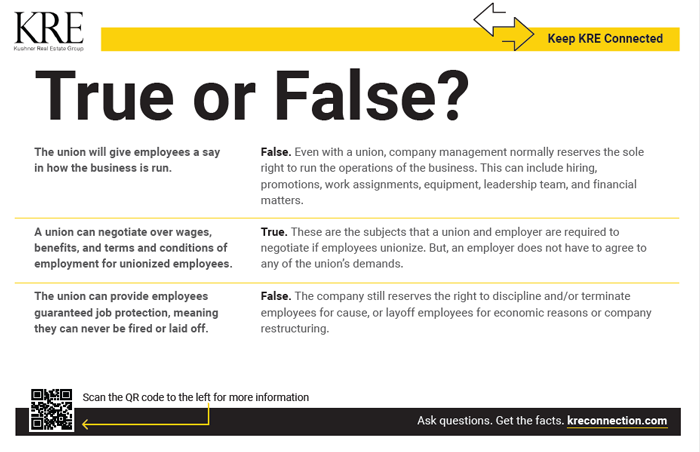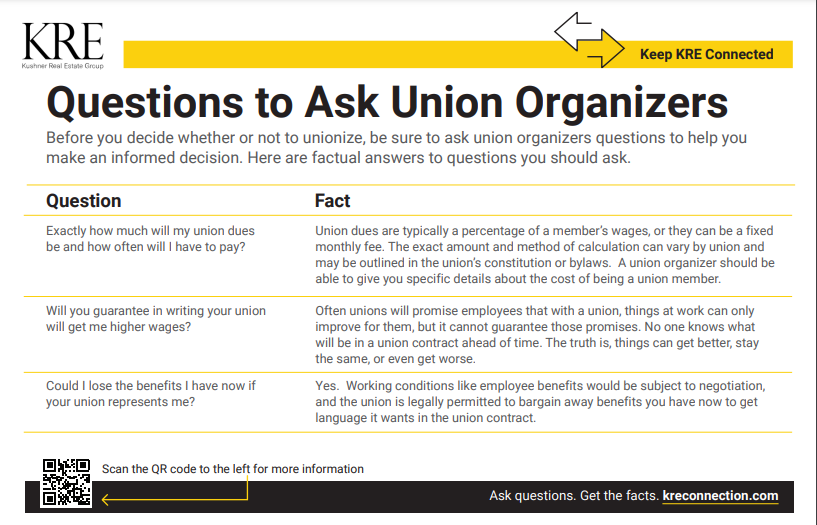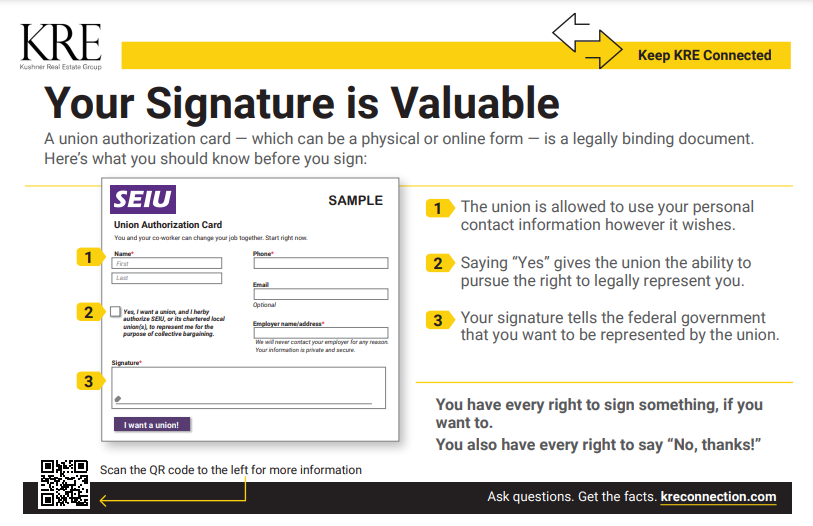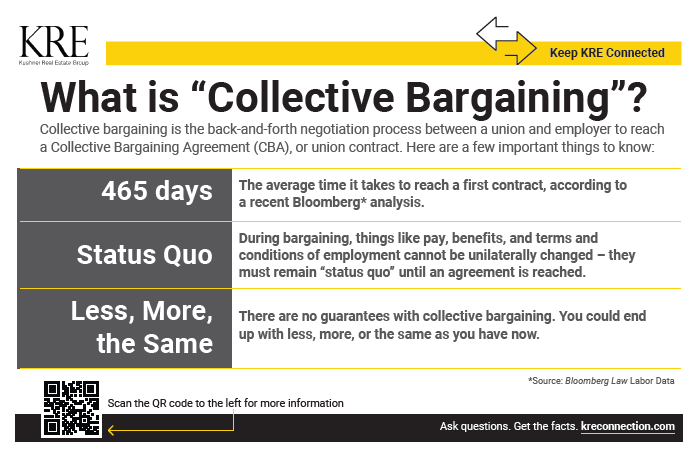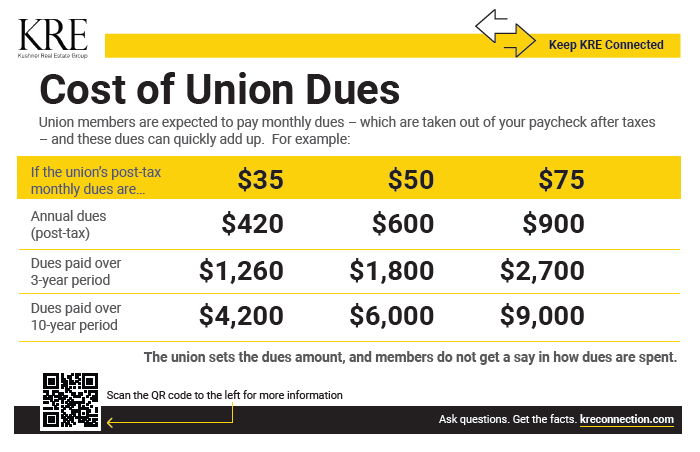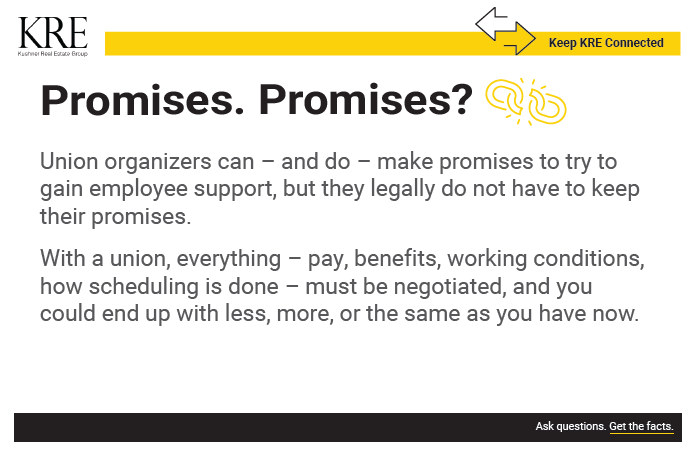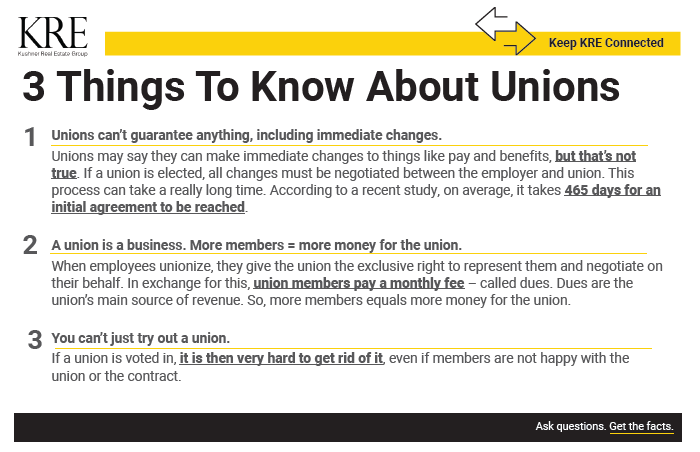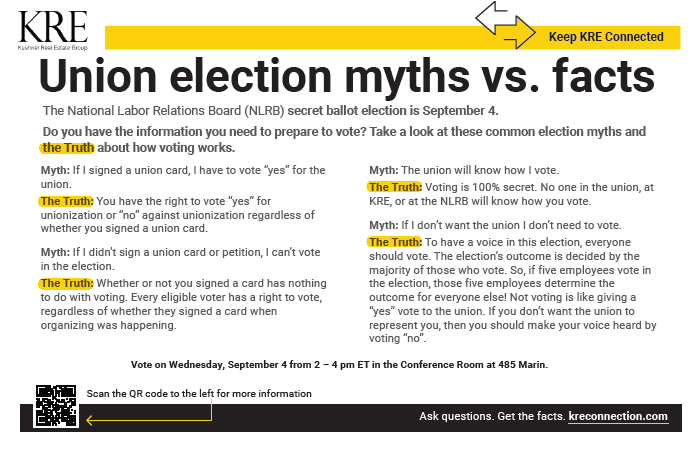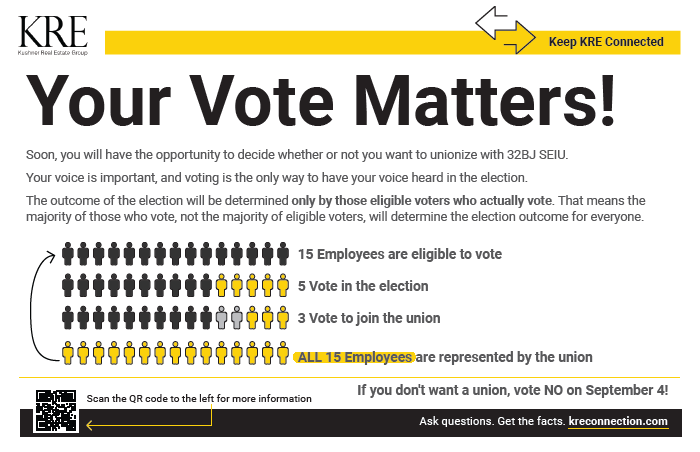KRE Connection
At The KRE Group, we believe that our employees are the cornerstone of our success. We are dedicated to taking care of our employees so that they can focus on providing the highest quality service to our residents. We value our collaborative relationship with employees and strive to create a work environment that fosters open and honest communication, inspires employees to do their best work, and recognizes the many contributions of our team.
We respect our employees and want them to be fully informed about matters that impact them, including unionization. This site is intended to be a resource for all staff to expand their knowledge on the topic of unionization. Whether you’re looking for insights or facts about unions, have questions, or want additional resources, you’ve come to the right place.
At The KRE Group, we believe that our employees are the cornerstone of our success. We are dedicated to taking care of our employees so that they can focus on providing the highest quality service to our residents. We value our collaborative relationship with employees and strive to create a work environment that fosters open and honest communication, inspires employees to do their best work, and recognizes the many contributions of our team.
We respect our employees and want them to be fully informed about matters that impact them, including unionization. This site is intended to be a resource for all staff to expand their knowledge on the topic of unionization. Whether you’re looking for insights or facts about unions, have questions, or want additional resources, you’ve come to the right place.
New content is posted regularly, so check back often to stay informed!
And if you have a question about something you see (or don’t see) – just ask!
Why KRE?
Benefits of Working at KRE
Here are just a few of the ways in which we care for our employees.
Wellness Benefits
We provide comprehensive medical, dental, and vision benefits to support you and your family’s total wellbeing.
Financial Benefits
We’re eager to help you build the future you want through our retirement savings plan, which includes an employer match and profit-sharing contribution each year.
Other Benefits or Perks
We offer a wide range of resources and guidance for your personal needs, including parenting, senior care, wellness, home services, and legal and financial services – all available 24 hours a day, 7 days a week.
Our Values & Culture
Lorem ipsum dolor sit amet, consectetur adipiscing elit, sed do eiusmod tempor incididunt ut labore et dolore magna aliqua.
Netus et malesuada fames ac turpis egestas maecenas pharetra. Lacinia at quis risus sed. Facilisi morbi tempus iaculis urna id volutpat lacus laoreet. Nec ullamcorper sit amet risus nullam eget felis. Placerat in egestas erat imperdiet sed.
Tempus iaculis urna id volutpat lacus laoreet non curabitur gravida. Parturient montes nascetur ridiculus mus mauris vitae ultricies. Diam donec adipiscing tristique risus. Dictum sit amet justo donec enim diam vulputate. Lacus sed turpis tincidunt id aliquet risus feugiat.



Understanding Unions
Click on the fact sheets below to enlarge and download.
FAQs About Unions
UNION 101
A union is an organization that represents workers in negotiations with employers over wages, benefits, and terms and conditions of employment. A union is a business, and its main source of revenue comes from monthly fees – called dues – that it charges members.
Unions can negotiate with employers over wages, benefits, and terms and conditions of employment, and it can provide representation for members if there is a dispute with management.
Unions cannot force an employer to do or give anything that the company does not agree to. Unions do not have a say in how the company is structured, who the company leaders are, or in operational matters.
This depends on your individual needs and workplace situation. It is important for each individual employee to consider whether the potential benefits outweigh the costs and limitations of union membership.
No, you do not have to talk to union organizers; it is your choice whether you want to engage with them or not. If an organizer or another colleague approaches you and you don’t wish to talk, you have the right to decline the conversation. If you choose to engage, it is recommended that you ask questions and request that any promises be put in writing.
Currently, your manager or other members of leadership can work directly with you if you have concerns related to pay, benefits, scheduling, or other working conditions. Managers can work with you to try to meet your individual needs.
If you unionize, then your managers will legally no longer be allowed to work directly with you on these matters. You would need to go to your union representative – who might also be a fellow coworker – instead.
UNION AUTHORIZATION CARDS
A union card, also known as a “union authorization card,” is a legally binding document that employees sign to indicate that they want the union to become their exclusive representative in negotiations with the employer over wages, benefits, and other working conditions.
Union cards are also a way for unions to collect your personal contact information, including phone number, personal email, and home address.
So, depending on the level of support, signing a card could be your final say in whether you want to be represented by the union.
However, if there is an election, you will be given the opportunity to anonymously vote on whether or not you want to unionize. You can vote whether or not you signed a card. And even if you did sign a card, you can still vote against unionizing. If an election is held, no one will know how you voted, or even whether you voted at all.
Union authorization cards generally look pretty simple. Physical cards often resemble a postcard. Electronic union authorization cards may appear to be even less formal, like filling out a short online contact form or brief survey. Despite their simple appearance, a signed union authorization card is a legally binding document that unions use to prove to the federal government that you authorize the union to act as your formal union representative.
No, you are not required to sign a union card to get more information about the union. Employees have the right to seek information and make an informed decision without signing anything.
No. Signing a union authorization card does not guarantee that you will get better pay or benefits or that your issues and concerns will be resolved.
Union organizers and those supporting the union can be extremely persistent. We want you to have the facts about your legal rights. Federal law provides employees with:
- The right to not sign or to sign a union authorization card or petition
- The right to campaign against or for the union
- The right to tell union organizers you are not interested and to ask them to leave you alone
If you’ve signed a union card and have changed your mind, it’s important to know that once signed, the card is typically considered the property of the union. While the union is not obligated to return the card, you can send a written revocation request to the union’s local office, ideally via certified mail, and also inform the National Labor Relations Board (NLRB) of this revocation. You may also try to revoke your authorization by asking the union in person to return the card.
COLLECTIVE BARGAINING
Collective bargaining is the back-and-forth process through which unions and employers negotiate terms and conditions of employment, such as wages, hours, benefits, and working conditions, to create a legally binding labor contract.
Collective bargaining typically involves representatives from the union (often union leaders who are not employees) and the employer (usually members of management or human resources). Both parties may also have lawyers present. Unionized employees may or may not be invited to participate in the bargaining process.
The length of the bargaining process can vary widely depending on the complexity of the issues, the relationship between the union and the employer, and the negotiation strategies used. A Bloomberg report found that, on average, it takes 465 days to reach an initial agreement.
A collective bargaining agreement (CBA) is the resulting contract from the collective bargaining process. It outlines the agreed-upon terms and conditions of employment and is legally binding for a specified period of time.
The union and employer negotiate to agree to the length of a collective bargaining agreement, which can vary. A CBA can expire after one year, three years, five years, or some other length of time. When a CBA expires, the union and employer can renegotiate the contract.
There is no legal requirement that the union and employer must reach an agreement. If the union and employer cannot reach an agreement, they may seek mediation or arbitration to help resolve the outstanding issues. In some cases, the union may decide to take members out on strike, or the employer may implement a lockout to exert pressure to arrive at a resolution.
UNION DUES
Union dues are regular payments made by members to the union. These dues are a union’s main source of revenue, and they fund the union’s operations. Members do not have a say in how the union spends the dues money it collects from members.
Union dues are typically a percentage of a member’s wages, or they can be a fixed monthly fee. The exact amount and method of calculation can vary by union and may be outlined in the union’s constitution or bylaws.
In most cases, union dues are automatically deducted from a member’s post-tax paycheck.
Union Representatives (or Union Stewards)
A union representative (sometimes referred to as a union steward or shop steward) is usually a fellow employee who is appointed to be a representative of the union and who acts as a spokesperson for unionized employees when it comes to matters covered by a union contract.
The duties of a union representative may include choosing what matters to bargain with management over, ensuring compliance with the collective bargaining agreement (or union contract), addressing employee grievances, and acting as a spokesperson for workers to management.
Union representatives are usually elected by their fellow union members; however, they may also be appointed by union leadership which can lead to the selection of individuals who are heavily invested in union activities. As fellow coworkers, they might not always act impartially and could use their position to further personal or union objectives. And since they represent all members of the bargaining unit, union representatives often need to decide what issues to prioritize and advocate for, which may not be in everyone’s individual interest.
A union representative may have access to sensitive information and/or documents relating to things such as employee grievances, disciplinary actions, personal contact details, and workplace disputes. This information can include details about individual employees’ performance, complaints, and personal issues.
485 Marin Election
Some employees at 485 Marin will soon have the opportunity to vote on whether or not to unionize with SEIU Local 32BJ. The Secret Ballot Election will take place on Wednesday, September 4 from 2 – 4 pm ET in the Conference Room. Please check back regularly for more information.
Ask Us Anything!
If you have questions about unionization, submit them here! All submissions are anonymous, but if you wish to receive a direct reply, please include your contact information.
Election Details
Election Time/Date/Location
Eligible Voters
What to Expect

